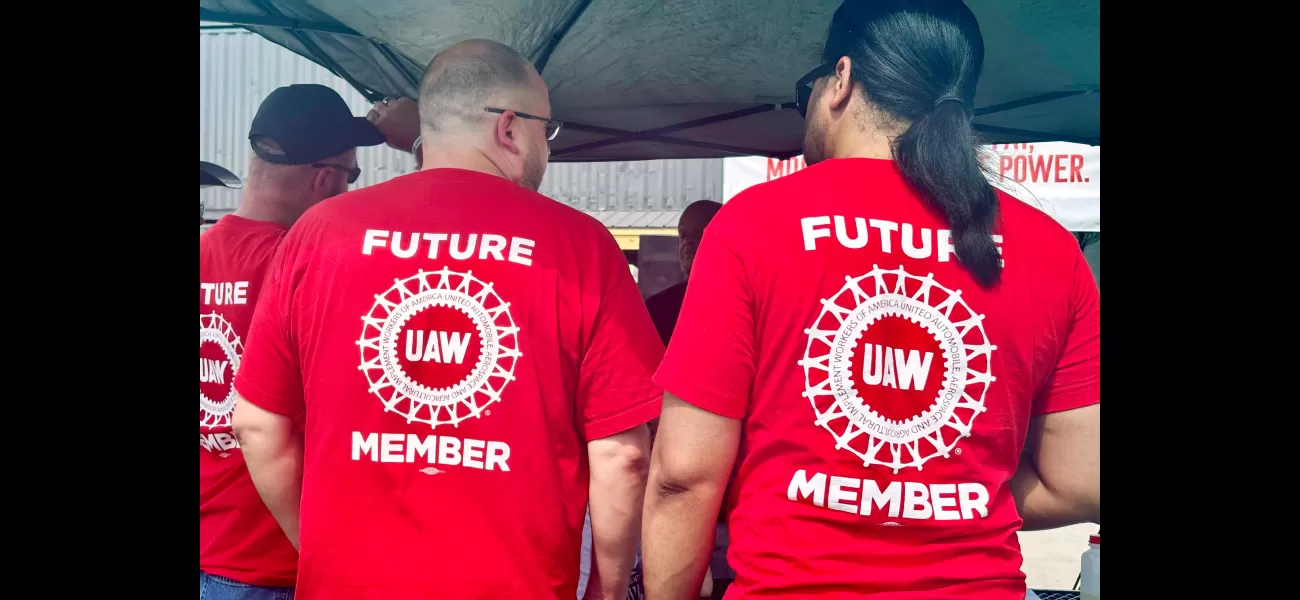UAW union promises comeback after defeat at Mercedes Alabama plant, determined to succeed.
UAW will resume efforts to unionize 150,000 workers at multiple auto factories, according to President Shawn Fain.
May 18th 2024.

On a Friday in Tuscaloosa, Alabama, there was a significant vote that dealt a blow to the United Auto Workers union's plans to organize workers at nonunion plants, particularly in the Southern region of the United States. The newly elected President, Shawn Fain, announced that the union will continue to pursue its efforts to organize around 150,000 workers at more than a dozen auto factories across the nation, including returning to Mercedes, the company that just voted against the union. The election, run by the National Labor Relations Board, saw a 56% vote against the union by employees at Mercedes' battery and assembly plants near Tuscaloosa. This was a significant setback for the UAW, coming just a month after their victory at Volkswagen's assembly factory in Chattanooga, Tennessee.
According to the final tally by the NLRB, 2,642 workers voted against the union, while 2,045 voted in favor. This was a high turnout, with almost 93% of eligible workers casting their ballots. Marick Masters, a professor at Wayne State University who has studied the union extensively, believes the UAW will need to analyze what went wrong and learn from their mistakes as they move on to organize other nonunion factories, mostly in the South. "They're going to have to go back to the drawing board," he said, suggesting that the union may need to get more workers to sign cards indicating their desire for a union election before calling for a vote. He also suggested that the union may need to respond more quickly to management's opposition.
Fain, the newly elected President, assured workers that the union will not give up and will continue to fight for their rights. He called the loss a "bump in the road" and not a failure, and he told company officials that the fight was far from over. "We've been here before, and we're going to continue on and we're going to win," he said confidently. "I believe we'll have a different result in the future, and I look forward to that."
The NLRB has stated that both sides have five business days to file objections to the election, and the union must wait a year before seeking another vote at Mercedes. Fain believes that the decision to challenge the election will be up to the union's lawyers, but he accused the company of "egregious illegal behavior." The union has already filed complaints against Mercedes, accusing them of trying to intimidate workers through management and anti-union consultants. However, Mercedes has denied these allegations. Fain also mentioned that they are following through with complaints in Germany, where Mercedes is headquartered.
One significant difference between the loss at Mercedes and the victory at Volkswagen, according to Fain, was that Mercedes actively fought against the union, while Volkswagen remained neutral. He accused Mercedes of holding captive meetings of workers to campaign against the UAW. In a statement on Friday, Mercedes stated that they look forward to continuing to work directly with their team members to build superior vehicles for the world. They also reaffirmed their focus on providing a safe and supportive work environment.
Alabama Governor Kay Ivey, who has been vocal in her opposition to the union, wrote a post on X stating that auto manufacturing is one of the state's most prominent industries, and they are committed to keeping it that way. She also urged the UAW to respect the results of the secret ballot election and stated that Alabama is not Michigan and is not a welcoming place for the UAW.
Melissa Howell, an employee who opposed joining the union, mentioned that she and others realized that the UAW was making promises they couldn't guarantee, such as a pay rate of $40 per hour, pensions, and better benefits. She stated that they kept repeating that workers would not lose anything, but she and others started to question these promises and reminded people that everything was negotiable. On the other hand, Kirk Garner, who works in quality control at the Mercedes assembly plant and supported joining the union, believes that workers were shown an anti-union video every day before the vote, and union opponents targeted employees they thought could be persuaded to vote against the union. "I'm disappointed in the people who flipped and believed the persuaders," he said.
The UAW's victory at Volkswagen was largely due to the prospect of substantially higher wages and other benefits. The recent contracts with the three major automakers, General Motors, Stellantis, and Ford, resulted in a 33% raise for workers by 2028, making it a powerful recruiting tool for the union. However, before Volkswagen, the UAW had little success in organizing nonunion auto plants in the South, where workers are generally less drawn to organized labor than in states like Michigan. A victory at Mercedes would have been a significant achievement for the union, as they have long struggled to overcome the appealing benefits that Southern states have offered foreign automakers, including tax breaks, lower labor costs, and a nonunion workforce.
Overall, the UAW's loss at Mercedes was a significant setback, but they remain determined to continue their efforts to organize nonunion factories in the South. As they face challenges and opposition, the union will have to analyze and learn from their mistakes to achieve success in the future.
According to the final tally by the NLRB, 2,642 workers voted against the union, while 2,045 voted in favor. This was a high turnout, with almost 93% of eligible workers casting their ballots. Marick Masters, a professor at Wayne State University who has studied the union extensively, believes the UAW will need to analyze what went wrong and learn from their mistakes as they move on to organize other nonunion factories, mostly in the South. "They're going to have to go back to the drawing board," he said, suggesting that the union may need to get more workers to sign cards indicating their desire for a union election before calling for a vote. He also suggested that the union may need to respond more quickly to management's opposition.
Fain, the newly elected President, assured workers that the union will not give up and will continue to fight for their rights. He called the loss a "bump in the road" and not a failure, and he told company officials that the fight was far from over. "We've been here before, and we're going to continue on and we're going to win," he said confidently. "I believe we'll have a different result in the future, and I look forward to that."
The NLRB has stated that both sides have five business days to file objections to the election, and the union must wait a year before seeking another vote at Mercedes. Fain believes that the decision to challenge the election will be up to the union's lawyers, but he accused the company of "egregious illegal behavior." The union has already filed complaints against Mercedes, accusing them of trying to intimidate workers through management and anti-union consultants. However, Mercedes has denied these allegations. Fain also mentioned that they are following through with complaints in Germany, where Mercedes is headquartered.
One significant difference between the loss at Mercedes and the victory at Volkswagen, according to Fain, was that Mercedes actively fought against the union, while Volkswagen remained neutral. He accused Mercedes of holding captive meetings of workers to campaign against the UAW. In a statement on Friday, Mercedes stated that they look forward to continuing to work directly with their team members to build superior vehicles for the world. They also reaffirmed their focus on providing a safe and supportive work environment.
Alabama Governor Kay Ivey, who has been vocal in her opposition to the union, wrote a post on X stating that auto manufacturing is one of the state's most prominent industries, and they are committed to keeping it that way. She also urged the UAW to respect the results of the secret ballot election and stated that Alabama is not Michigan and is not a welcoming place for the UAW.
Melissa Howell, an employee who opposed joining the union, mentioned that she and others realized that the UAW was making promises they couldn't guarantee, such as a pay rate of $40 per hour, pensions, and better benefits. She stated that they kept repeating that workers would not lose anything, but she and others started to question these promises and reminded people that everything was negotiable. On the other hand, Kirk Garner, who works in quality control at the Mercedes assembly plant and supported joining the union, believes that workers were shown an anti-union video every day before the vote, and union opponents targeted employees they thought could be persuaded to vote against the union. "I'm disappointed in the people who flipped and believed the persuaders," he said.
The UAW's victory at Volkswagen was largely due to the prospect of substantially higher wages and other benefits. The recent contracts with the three major automakers, General Motors, Stellantis, and Ford, resulted in a 33% raise for workers by 2028, making it a powerful recruiting tool for the union. However, before Volkswagen, the UAW had little success in organizing nonunion auto plants in the South, where workers are generally less drawn to organized labor than in states like Michigan. A victory at Mercedes would have been a significant achievement for the union, as they have long struggled to overcome the appealing benefits that Southern states have offered foreign automakers, including tax breaks, lower labor costs, and a nonunion workforce.
Overall, the UAW's loss at Mercedes was a significant setback, but they remain determined to continue their efforts to organize nonunion factories in the South. As they face challenges and opposition, the union will have to analyze and learn from their mistakes to achieve success in the future.
[This article has been trending online recently and has been generated with AI. Your feed is customized.]
[Generative AI is experimental.]
0
0
Submit Comment





